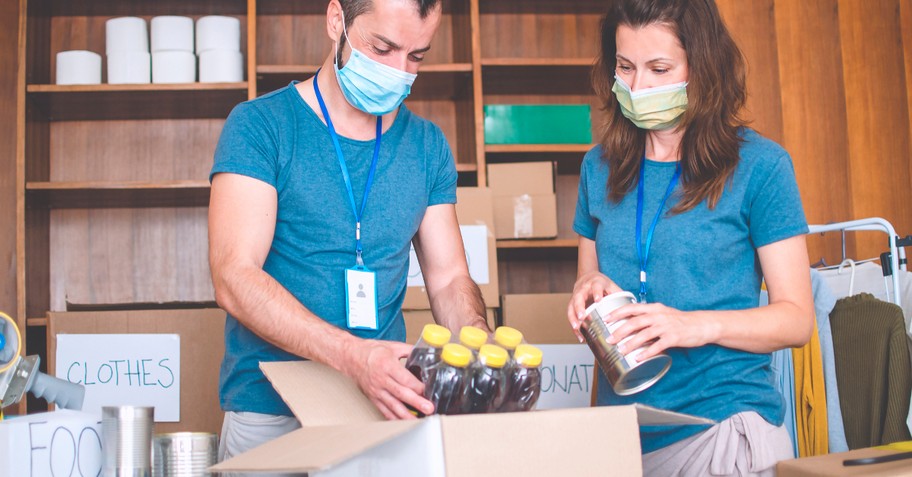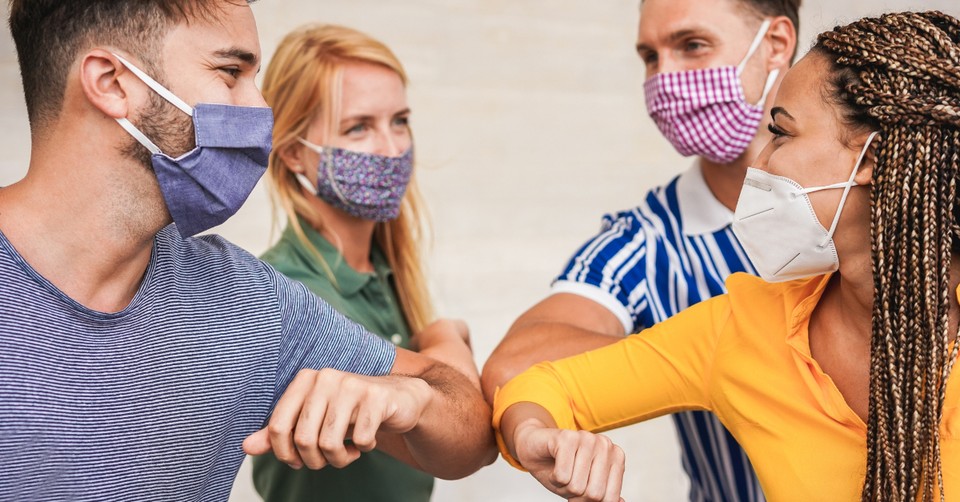Church in the era of COVID-19 is tricky. Gathering during this pandemic has been prohibited in some places; and in other cases, large gatherings have just been too risky. So, how do we continue to grow in our faith when our traditional view of church has been shaken up for the time being?
We can choose to see this as an opportunity to grow in a new way rather than a setback to our ability to be the hands and feet of Jesus. One day we will be able to gather restriction-free again because this too shall pass. In the meantime how can we get creative about continuing to grow in our faith walks and cultivate community?
Small groups offer safer, smaller, and more flexible spaces for us to connect with other believers. This is a moment where these smaller groups can rely on each other in a new way to be each other's “church” when connecting to the larger resources of your faith community isn’t possible.
At the start of the pandemic, most of us saw this season as a short-term disruption to our normal. We maybe took a pause from small groups because we hoped that we’d be back to normal in a matter of weeks. Now, as we are seeing the timeline is stretching into the Fall where normal gatherings will need to be approached with caution, it is time to think through how we can revitalize our groups so we can remain connected through the storm that is 2020.
Here are a few ideas on how to reimagine your small group to weather the storm of COVID-19:
Photo Credit: ©GettyImages/DisobeyArt

1. Embrace Flexibility As You Plan Your Group’s Semester
Each week of this fall may require a different approach than the previous one. When you start planning out how to gather, take time to prepare for different scenarios that may make getting together in-person impossible.
Some gathering options could include gathering in-person restriction-free, some weeks meeting via Zoom, and some weeks opting for a socially-distanced meeting outdoors that keeps the risk of shared germs low.
This past week, our family got our first dose of needing to be flexible. Our kids just started participating in one activity for the summer. Another kid that also participated in the same sport tested positive for COVID-19.
He was not sick at practice, or in close proximity to our kids, but nonetheless as a result we had to isolate as a family for 14 days to make sure no one else was exposed. We are healthy, but we cannot risk unknowingly spreading our germs if we are pre-symptomatic or asymptomatic and contagious.
This is what venturing back into society looks like—taking one step out and then possibly taking a temporary step back again as a precaution. There are so many scenarios outside of state-mandated shutdowns that may mean your group needs to opt for a virtual option for a few weeks.
A friend of ours has to self-quarantine for 14 days to be allowed to see a family member who has cancer and is highly vulnerable if infected during this time. Others may need to quarantine because they went on vacation to a hotspot. Some may need a medical procedure completed and need to quarantine to keep themselves safe from infection. Others may be expecting a baby and want to ensure they don’t test positive before having to go to the hospital to give birth.
All of the scenarios are ones that close friends of ours have encountered. They still need a way to connect to a community and be encouraged by other believers even though circumstances limit their ability to meet in-person. Connecting online during these stints of isolation is so helpful to keep your group going during this unpredictable season.
Photo Credit: ©GettyImages/Kiwis

2. Watch Church Online Together As a Small Group
Online church has its limitations. While we all can be thankful for the ability to still hear the truth shared by pastors and leaders through the internet it just doesn’t replace the richness that gathering with others in-person offers.
While churches are reopening, most still have to limit their capacity and cannot offer childcare. Beyond that, many may not be comfortable going to church for fear of exposure to the virus. A great middle option that allows for connecting with others from church in-person but in a much smaller capacity in getting together to watch church online as a small group.
The past few weeks our small group has done this. We all have young kids and bringing them to church without childcare is not easy. We’ve set up a TV out on a carport, set up our chairs in spaced out rows, and worshiped together in the outdoors. When our kids inevitably lost interest, they could run around outside and play. Afterwards the adults were able to reflect together on the sermon. This has been such a life-giving practice.
In the months ahead we all are going to have to make choices that require a calculated risk. Keeping a small circle that we can rely on while normalcy is on hold can help us stay encouraged while keeping our risk of exposure low.
Photo Credit: ©Sparrowstock

3. Serve Your Community Together
There is no doubt about it: our world is hurting right now. Universally we are struggling with fear, isolation...and questions around our work, children's education, safety, and more. On top of the universal way this pandemic has pulled the rug out from all of our lives in one way or another, we are also as a society grappling with the issue of racial justice.
This is a moment for the church to rise up in a strong way to show the love of God to our hurting world.
Yet, it’s not easy to organize an entire church-wide response to our communities’ pain when we can’t all meet at a central location. So small groups can take the lead here...finding ways to reach out to our communities together. Get your group fired up about Jesus by meeting a tangible need in your community in this season.
Some ideas include:
- writing letters to the elderly that cannot safely socialize
- checking with local food banks to see how you can support them as they respond to a higher demand
- finding ways to support foster parents that are without the traditional resources such as in-person schooling
- supporting your neighborhood by seeing if there are projects that need to be tackled that the pandemic has pushed off
- finding ways to build bridges across races
- fighting for justice in your communities
Just use your creativity and talents as a group to meet a need.
The Bible says in Luke 10:2, that the harvest is great but the workers are few. There is a lot of need in our world and it’s up to us to offer the only real solution to our pain—Jesus. When we step out of our comfort zones to see the lost and hurting, our faith comes alive in a powerful way.
It’s easy as a group to want to retreat into your homes, but Jesus calls us to action. Find safe ways to show God’s love together.
Photo Credit: ©GettyImages/Biserka Stojanovic

4. Start a Small Group
You may be thinking how you really wish you had a small group to rely on during this time of isolation. Chances are you’re not the only one! It may feel like a hard or strange time to start a group because meeting takes a high level of creativity, flexibility, and unpredictability; but people need ways to connect to other believers more than ever before.
Take the plunge and start a group! We had just started a group at the start of COVID-19 lockdowns and were unsure how to continue through the spring and took a step back. Now we have had time to regroup and rethink how our group can function in the midst of all the changes. We’ve decided to restart the group using Zoom meetings for our discussions with occasional in-person hangouts over the semester to help boost our community.
This hybrid approach has helped us give options to those in the group that are less than comfortable gathering at this time. Also, we are all parents, so choosing to Zoom at a time that our kids are either occupied or in bed helps us engage in more intentional conversation as well as avoid the tricky question of childcare. When we meet in-person, those who are uncomfortable can opt out and we have no need to provide childcare at these gatherings.
This is just one example of ways a new group can begin despite all the limits the coronavirus has caused. Don’t let the need to innovate and embrace flexibility stop you from reaching out to build more community.
Hebrews 10: 24-25 says, “And let us consider how we may spur one another on toward love and good deeds, not giving up meeting together, as some are in the habit of doing, but encouraging one another—and all the more as you see the Day approaching.”
Let’s not give up on meeting together! We need to show up in whatever space is safely available to our communities to offer encouragement and love to each other.
Recommended for You:
Why ‘Not Giving Up Meeting Together’ Matters during COVID-19
Is the Phrase ‘This Too Shall Pass’ in the Bible?
8 Reasons Small Groups Are So Important to Jesus
7 Ways to Encourage Real Talk in Small Groups
7 Ways COVID Shows How Desperately the World Needs God
5 Questions to Calm Your Fears As We Emerge from COVID-19
Photo Credit: ©GettyImages/WavebreakMedia
Originally published July 30, 2020.








